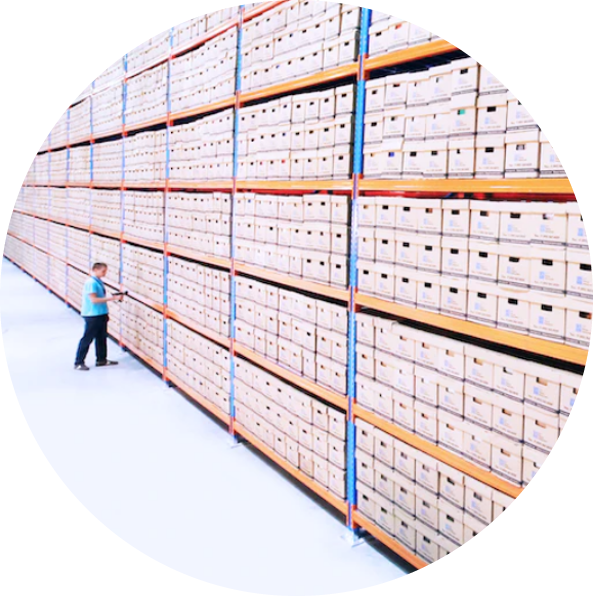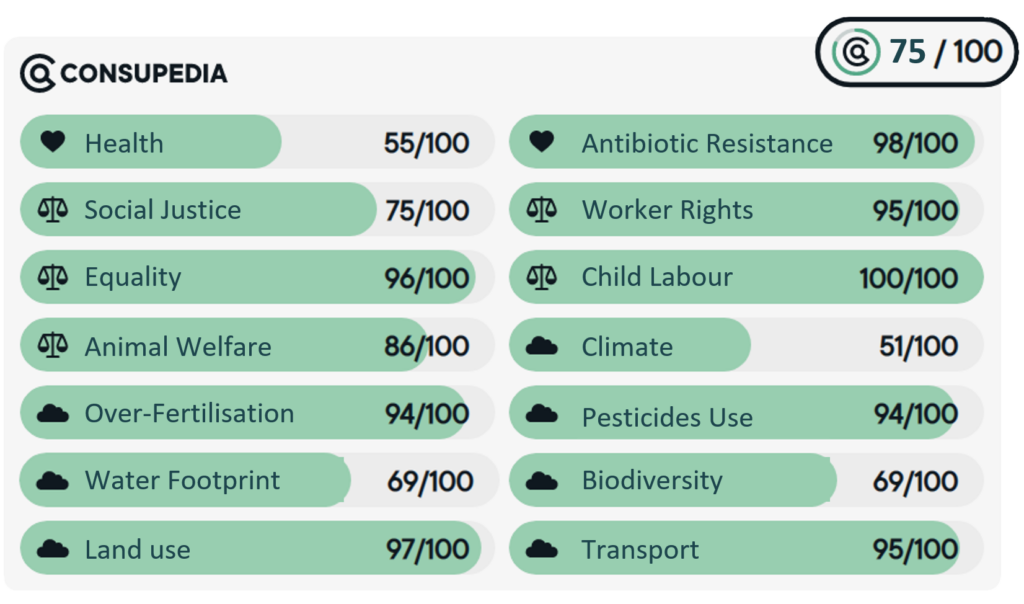The Consupedia database contains comprehensive sustainability information on more than 250,000 products on the Swedish market. Setting a new standard for evaluating the sustainability of food products, our unique process allows us to assign each ingredient of a food product an unlimited amount of sustainability information such as impact on climate, biodiversity and social justice.
How it works
Consupedia assigns unique food products their sustainability information in three steps:

Step 1
We search through a large number of databases to find the information needed to analyze the product.
All data is retrieved from leading sources of knowledge, such as the UN Food and Agriculture Organization (FAO).

Step 2
Our Consupedia bots (AI) analyze massive amounts of text, finding and dividing relevant parts into tabular form.
The bots have the capacity to collect a country’s full range of food products in a matter of months.

Step 3
We can then assign every row in the table (e.g. an ingredient) an unlimited amount of sustainability information.
This includes environmental factors such as biodiversity and climate impact; social justice factors; and consumer health.
Our database is constantly growing alongside scientific knowledge in society

Whenever we identify a new source of information that can be connected to any of the attributes of a product, this information is incorporated in our database. This means that Consupedia is continuously evolving to reflect the rapidly expanding scientific knowledge about how human activities influence the planet.
Biodiversity
Our food has an adverse effect on Earth’s biodiversity. Plant and animal species are in alarming decline due to pesticides, monocultures, deforestation and other destructive practices regularly involved in food production.
NOVA
Food can be processed in different ways before reaching the consumer. There is a growing amount of research that suggests that a diet built on ultra-processed food (often calorie-dense and low in nutrients) can be associated with ill-health..
Nutri-Score
Our food choices have a profound effect on our health and wellbeing. An unhealthy diet increases the risk for diseases such as obesity, type 2-diabetes, cardiovascular disease and certain forms of cancer. The diseases cause great suffering for individuals as well as society as a whole..
Health
The Consupedia Health Score is calculated by Consupedia based on the product’s Nutri-Score and is displayed on a scale from 1–100. The higher the score, the better the product is from a health perspective.
Antibiotic Resistance
Antibiotics are medicines that are used to treat bacterial infections. Unfortunately, bacteria can develop an ability to withstand the medicines. An overuse of antibiotics for food-producing animals is an important driver for this development..
Over-consumption
Certain food ingredients can be harmful when consumed in excessive amounts. When consuming food that has an overconsumption alert, you should be mindful not to eat or drink too much of this food.
Allergenes
Consupedia warns its users when food products contain ingredients that may cause allergic reactions, such as milk protein, nuts, pollen, gluten, soy and peanuts.
Cross Allergies
Some food ingredients may cause allergic reactions for individuals who are allergic to similar substances. For instance, individuals who are allergic to beech pollen can suffer reactions from eating apples or hazelnuts.
Intolerances
Some food ingredients can cause discomfort for individuals who are intolerant to these ingredients. However, being intolerant to an ingredient (e.g. lactose) is not the same as being allergic.
Equality
In a sustainable society resources and rights are equally available to all people. Unfortunately, this is far from reality today. Inequality causes suffering to a large part of the global population and is a recurring cause for conflict.
Animal Welfare
A significant part of our food contains ingredients from animals such as pigs, cows, chicken and sheep. Unfortunately the animals are often subjected to great suffering during their lives in captivity.
Social Justice
Social justice is about to what extent people can reach their full potential in the society that they live in. There is no country that can be said to be fully fair and in many places social injustice runs deep between different parts of the population.
Worker Rights
According to the International Labor Organization, 27 percent of the global workforce were working in agriculture in 2019. For many, working conditions are poor and demanding.
Child Labor
In the poorest countries of the world, more than one in four children carry out work that is harmful for their health and development.
Land Use
According to data from the UN Food and Agriculture Organization (FAO), more than half of the planet’s habitable land is used for agriculture. As humans are taking up more and more space for our food production, other species are losing their natural habitat.
Pesticides Use
In many parts of the world, chemicals that are harmful for people as well as the environment are being used in the production of food.
Fertilizer Use
As large amounts of nutrients leak from agricultural land into freshwater systems and oceans, it leads to an over-fertilization which causes severe damage to the environment.
Climate CO2e
Our food is a key driver for climate change. About one third of all greenhouse gas emissions caused by human activities comes from our food system.
Climate Score
The Consupedia Climate Score is based on the product’s CO2e, and presented on a scale from 1–100.
Water Footprint
According to the OECD, agriculture irrigation accounts for 70% of humanity’s water use. If not managed properly, this can lead to devastating effects on the environment.
Packaging
Both materials and designs of food packaging can have an important impact on the environment.
Transport
Our food is constantly being traded and transported from one end of the world to another. Transporting ingredients and food products is responsible for a considerable amount of greenhouse gas emissions.
